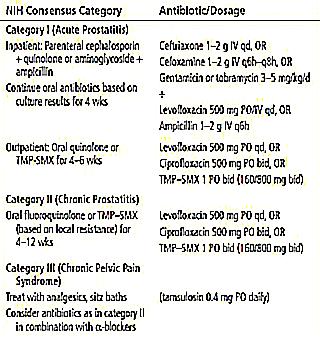ADS:
Medicines for prostate treatment:


In addition to acute bacterial prostatitis, there are other forms:
Chronic prostatitis of bacterial origin is an inflammation of the prostate gland with a gradual onset, caused by an infection, usually of a persistent nature.
Compared to the acute form, chronic bacterial prostatitis is a milder disease, but has a much longer duration (at least 3 months).
Chronic bacterial prostatitis can be:
Increase the risk of developing chronic bacterial prostatitis:
In the absence of proper treatment, a number of complications can arise:
As a rule, the diagnostic route to identify chronic bacterial prostatitis and its exact causes begins with an objective examination, followed by a thorough history; therefore, it continues with the so-called digital rectal analysis (ERD) and palpation of the inguinal lymph nodes; finally, it ends with a blood test, urinalysis, laboratory analysis of prostate fluid obtained after massage of the prostate gland, urethral smears aimed at detecting sexually transmitted infections, urodynamic examination, cystoscopy and ultrasound of the urinary tract.
During this analysis, the thought of which terrorizes many patients, a doctor (usually a urologist) manually analyzes the health of the prostate gland by gently inserting fingers into the rectum, well lubricated and protected by a glove. Since the prostate is located directly in front of the rectum, the examiner can touch the upper surface of the prostate gland. If this surface is enlarged, tender and painful, it is very likely that the prostate is inflamed or, in any case, not in full health.
Similar to the treatment of the acute form, the treatment of chronic bacterial prostatitis consists of special antibiotic therapy.
It can be said that effective treatment of Chronic prostatitis is difficult for at least two reasons:
To minimize the risk of relapse, it is important to follow your doctor's recommendations for the duration of antibiotic therapy and the best ways to take your medication.
The duration of antibiotic therapy varies from patient to patient, in some cases, 6-8 weeks of therapy is sufficient; otherwise it will take 12 weeks (3 months) or 6 months.
Typically, when antibiotic therapy lasts 5 to 6 months, medications are applied for 2-3 weeks for each month of treatment.
To relieve some of the symptoms of chronic bacterial prostatitis, especially pain, doctors advise:
Formation of a prostate abscess requires a minor surgical procedure to drain the pus.
Bactemia and sepsis require additional antibiotic therapy, which must be administered in a hospital under close medical supervision. Bacteria and sepsis are two medical emergencies and as such require the immediate intervention of experienced professionals in the field.
Finally, the inability to urinate forces patients to use a catheter to empty their bladder.
For the prevention of chronic bacterial prostatitis it is important:
Known and classified in the 1960s as prostatodynia, chronic nonbacterial prostatitis is the most common form of inflammation in the male population.
The exact reasons are unclear at this time; however, they still highlight:
As a rule, to diagnose chronic non-bacterial prostatitis, doctors do the same exams and laboratory tests as in the case of suspected bacterial prostatitis. Moreover, the only way to know which form of inflammation is in question is to look for bacteria in the blood, urine, and prostatic fluid. The absence of bacteria in these organic fluids, combined with the typical symptoms of prostate inflammation, is militant in favor of non-bacterial chronic prostatitis.
Currently, there are no specific treatments for this form of the disease, but only symptomatic means. Once again, we can add that the effective treatment of chronic prostatitis is quite complicated.
Among these symptomatic remedies for prostatitis, effective:
In fact, it needs to be clarified that for many years there has been a discussion about the use of antibiotics to treat some chronic forms of the disease: for some doctors antibiotic therapy is good, for others it is useless, even potentially dangerous.
Many chronic conditions that cause persistent pain are difficult to treat in certain ways and tend to recur occasionally, chronic nonbacterial prostatitis is often responsible for episodes of depression and anxiety.
Potential solutions for coping with depression and anxiety from chronic persistent pain, according to doctors, include support groups for people with similar disorders and the use of natural antidepressants.
Formulating a prognosis for chronic non-bacterial prostatectomy is very difficult, since this condition manifests itself differently from patient to patient:
Natural traditional medicines appear to relieve symptoms of chronic nonbacterial prostatitis:
Asymptomatic prostatitis is an inflammation of the prostate gland that does not cause any symptoms in men. Doctors have not yet understood the reason why this condition is asymptomatic. As a rule, asymptomatic prostatitis does not require any treatment.